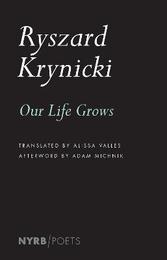
|
Our Life Grows
Paperback / softback
Main Details
| Title |
Our Life Grows
|
| Authors and Contributors |
By (author) Alissa Valles
|
|
By (author) Ryszard Krynicki
|
| Physical Properties |
| Format:Paperback / softback | | Pages:120 | | Dimensions(mm): Height 178,Width 115 |
|
| Category/Genre | Poetry by individual poets |
|---|
| ISBN/Barcode |
9781681371603
|
| Classifications | Dewey:891.8517 |
|---|
| Audience | |
|---|
| Edition |
Main
|
|
Publishing Details |
| Publisher |
The New York Review of Books, Inc
|
| Imprint |
The New York Review of Books, Inc
|
| Publication Date |
14 November 2017 |
| Publication Country |
United States
|
Description
The Polish poet Ryszard Krynicki, born in a Nazi labor camp in Austria in 1943, became one of the most prominent poets of the New Wave generation of 1968, his poetry offering what Adam Michnik has called "A strange and beautiful testimony." (Merging). "Conrad's heroic ethics with a great metaphysical perspective." (Krynicki is the author of a body of work marked at once by the solitude of a "Poete maudit" and solidarity with a hurt and manipulated community). The collection Our Life Grows appeared first in an edition crippled by Communist censorship, then in 1978 in the uncensored Paris edition which forms the basis for this translation. These poems, combining a biting wit and rigorously questioning mind with a surreal imagination, are a vital part of the story of post-war Europe.
Author Biography
Ryszard Krynicki was born in Sankt Valentin (Lower Austria) and is considered one of Poland's most important contemporary poets. Krynicki has long been associated with the political opposition in Poland, and was banned from official publication between 1976-1980. In 1989, he founded an influential publish house, a5, that focused on contemporary Polish poetry. He lives in Krakow. Alissa Valles is a translator of Polish literature and a poet.
Reviews"Krynicki has a rare gift of naming things even in shortest poems; he goes straight to the essence. Among Polish poets and readers he has the reputation of a master, of an archer who never misses." -Adam Zagajewski "His dense verbal play, his allusive language, was always a way of challenging official speech and ideology, normative language, normative feeling." -Edward Hirsch
|